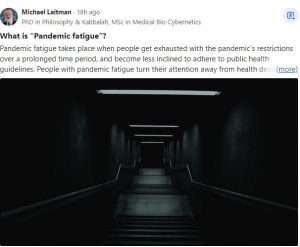
Pandemic fatigue takes place when people get exhausted with the pandemic’s restrictions over a prolonged time period, and become less inclined to adhere to public health guidelines.
People with pandemic fatigue turn their attention away from health department regulations, and while different people feel and react to it differently, symptoms often include restlessness, irritability, low motivation, and difficulty to concentrate. It might also include socially retreating or changing eating and/or sleeping patterns.
Also, people experiencing pandemic fatigue might react by blatantly opposing its regulations: attending parties, protests, cafés, restaurants, bars, and generally rejecting social distancing, mask-wearing and the recommended level of personal hygiene.
However, despite the various types of pandemic fatigue that many people experience as we plod forward in these testing times, the coronavirus itself remains unaffected. As carelessness increases, so do the amount of people testing positive for the virus. And we see that wherever governments loosen their public health restrictions, infections also increase.
The stressful paradox that many face today, where on one hand, they see no light at the end of the pandemic’s tunnel the further they trod into it, and on the other hand, they burn out in desperation, will lead more and more people to erupt in resistance to the regulations.
Pandemic fatigue should ultimately serve to accelerate our demand to try new remedies for the coronavirus. Instead of twiddling our thumbs waiting for vaccines, we can try to implement a remedy that is risk-free, and which costs us nothing. Before discussing this remedy, I’ll make an important disclaimer that this by no means suggests that we pay no attention to public health guidelines, but on the contrary, while rigorously following public health regulations, we can try to implement the following remedy to the coronavirus: adjusting our attitude to each other to think positively, considerately and responsibly toward one another.
If we could look deeper into what brought about this pandemic, then we would see that negative attitudes to each other create the biggest imbalance in nature, which invites a negative response upon us from nature. Likewise, if we change our attitudes to each other from negative to positive, careless and exploitative to considerate and responsible, then we would enter into balance with nature—and nature would respond positively to us in return.
So while we keep our physical distance from each other for the time being, we would be wise to seek how we could become closer in our mental and emotional distance. One practical way to do so is by relating to the observance of the health department regulations not for each one’s individual protection, but on the contrary, that we observe the health department regulations, keeping our social distance and wearing masks, etc., in order to not infect others. In other words, if we all thought of only “myself” as the one who hosts the virus, and that I now do not want to infect anybody else with it, then we would be on track to seeing the virus quickly subside from our lives.
Inverting the focus from one’s personal protection and benefit to the protection and benefit of others holds immense power. By using this period to make significant improvements in our concern and responsibility toward other people, we would bear witness to tremendously positive effects spreading throughout human society, starting by securing each other’s health.
We thus have nothing to lose and everything to gain, just to twist a little attitude knob within us so that we relate positively, considerately and responsibly toward each other, and then we would be headed on a path to healing not only ourselves, but human society as a whole.
Featured in Quora